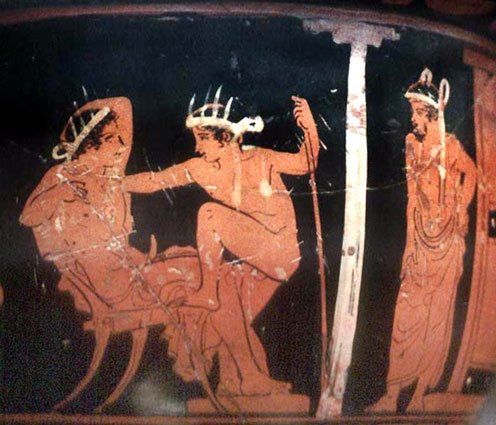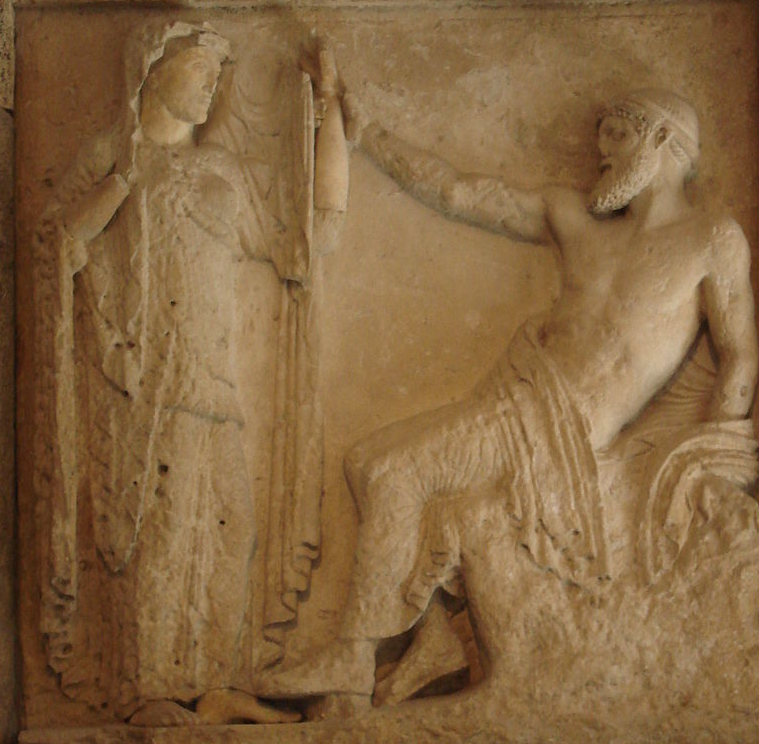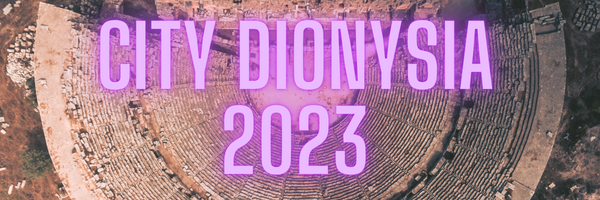The Sweetest Love Stories in Greek Mythology
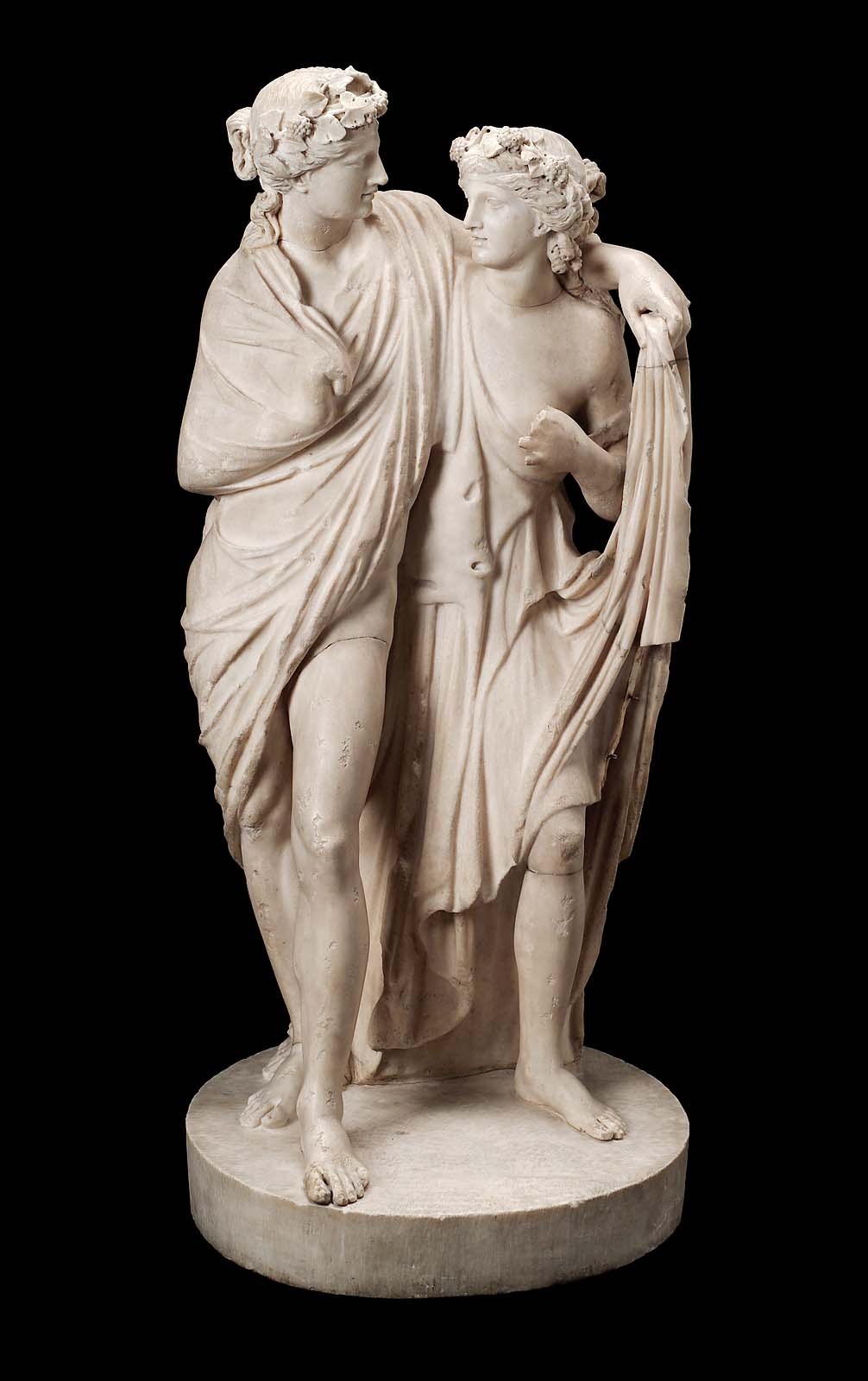
Greek mythology is well-known for its tragic stories and destructive romances. Maybe not surprising as love is often described as madness and something dangerous in ancient Greek texts. But I want to tell you only sweet and happy ones today.
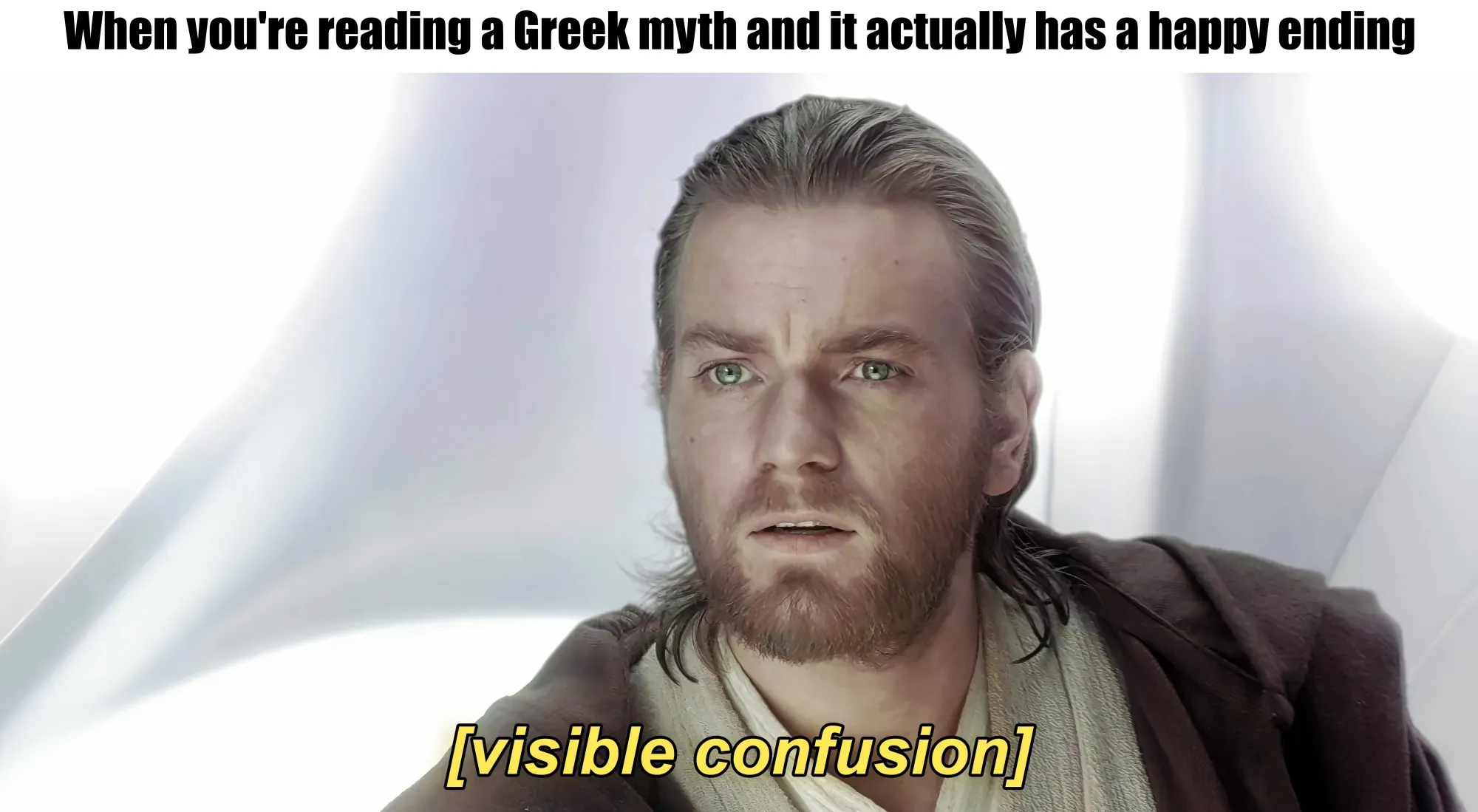
1. Apollon and Branchos
Apollon gets a bad rep as an unlucky lover. Though there are definitely some of his attempts at courting that failed, he has a plethora of successful relationships, not to mention his longterm polycule with the Nine Muses. Apollon and Branchos is such a happy love story.
There are several versions, of course. I'm recounting how things went down in the writings of Conon and Kallimachos.
Branchos was a pretty shepherd boy from Miletos in Asia Minor. In Conon's account he was working as a shepherd when he met Apollon, fell in love, and kissed him. Branchos, had had the gift of prophecy breathed into him by Apollon and established an altar of "Apollo of the Kiss" where he had kissed him. Branchos became a seer in Didyma, which became the best, after Delphi, of all Greek oracular sites.
In Kallimachos' version of their first meeting, Apollon meant to seduce Branchos and offered his help with the milking of the goats but he got so distracted by the sexy shepherd boy that he ended up milking a billy goat. In that version, Apollon promised safety and good graze for the flocks if Branchos decides to become his eromenos, similar to how he promised a good education to Hyakinthos.
After they made out, the god gifted him a garland and a wand of laurel. Apollon instructed Branchos in how to perfect the art of prophecy he had received and he looked after the sheep while Branchos practiced and honed this new craft.
Many years later, Branchos suddenly disappeared, possibly because he was taken away by Apollon and brought to Elysion, the Island of the Blessed.
I tell their story in more detail here.
2. Hephaistos and Aglaia
The marriage of Hephaistos to Aphrodite is more famous but it ended in disaster because Aphrodite was given to Hephaistos as a prize without her consent when he freed Hera from the fetters of his own making. Aphrodite was already in love with Ares at the time and the two of them continued their relationship as an extramarital affair until they were ingeniously caught in the act by Hephaistos with a golden net after his friend Helios tipped him off about what had been going on behind his back.
In the Iliad and Dionysiaca, Ares and Aphrodite are consorts while Hephaistos is married to the Kharis (Grace) Aglaia. According to Hesiod, she is the youngest of the Kharites (Graces) and he gives us her name as Aglaia while the Iliad only refers to her as "Kharis of the shining veil". The name Aglaia appears again in one of the Orphic fragments while the Dionysiaca refers to her as "Kharis".
Their love story is not spelled out in the myths but happens between the lines, so to speak. The Dionysiaca makes it clear that Hephaistos and Aphrodite were married but divorced and both have different partners by the time of Dionysos' Indian war. Aphrodite is with Ares and Hephaistos with "Kharis", who is likely Aglaia. In the Iliad, which should take place after the events in the Dionysiaca, Hephaistos and "fair Kharis, whom the famed god of the two strong arms had wedded" are still married. Kharis / Aglaia welcomes Thetis when she comes to visit Hephaistos and she has a conversation with him when she lets him know that Thetis is there to see him. Hephaistos then tells her that Thetis cared for him after he had been flung from Olympos by Hera and saved his life, so whatever she needs from him shall be hers. Thetis famously asks for armour to give to her son Achilles and of course Hephaistos fulfils her wish. The interaction between Hephaistos and Aglaia, though brief, shows a marriage in which he can be vulnerable with her, speaking openly about his painful past. While Hephaistos and Aphrodite have no children other than Eros and Harmonia, both of which were fathered by Ares, Orphic fragment 182 relates that Hephaistos and Aglaia have four daughters who adorn the world with beauty: Eukleia, Eupheme, Euthenia, and Philophrosyne.
To me their story is sweet because Hephaistos and Aphrodite were clearly not a great match and sometimes it's best to end things and find someone who truly makes you happy. Aglaia is an attendant of Aphrodite, which suggests that the goddess of love is supportive of their relationship. Happy ending for all!
3. Atalante and Melanion (or Hippomenes)
There are several versions of Atalante's myth that make her out to be greedy or Melanion to outsmart her. But there is a very sweet version by Ovid of all people! What makes their love story sweet is that Atalante and Melanion likely knew each other from the Caledonian Boar Hunt. The list of heroes partaking in the quest varies, for obvious reasons, but there is at least one source listing Melanion. Atalante was with Meleagros at the time, so it makes sense he wouldn't have approached her, even if he fancied her. Atalante didn't want to get married, so all suitors had to race against her. Those who couldn't outrun her were put to death. Only a man who succeeded in beating her in the race would be her husband. "Melanion came to run for love of her" and he must have known how fast she was but he had the power of Aphrodite on his side. In Ovid's version, Hippomenes is the grandson of Poseidon and he does not know her before he sees her in the nude, racing other unlucky suitors. He is immediately attracted to her and Atalante is sad when he challenges her, as she is also attracted to him. Hippomenes prays to Venus to "smile upon the love" she has inspired. Venus presents him with three golden apples. Atalante is already delaying her speed somewhat in the race but it is when he throws the golden apples that she decides to go after them and pick them up. She does this twice and still catches up to him. Only the third time she hesitates because there is no catching up so close to the finish line but Venus makes her go after it anyway. The race ends with Atalante "pleased that she has lost" and we can see her choice in the matter when she goes after the third apple because love (Venus) makes her do it. The myth makes it clear that Melanion could never have outrun her but she let him win because she wanted to marry him.
Later, they get so hot for one another that they have sex in a temple, thereby desecrating it, and they get changed into lions as punishment. It was a good run while it lasted!
4. Philemon and Baucis
Zeus went to Phrygia disguised as a human, this time not to fuck but in his role as a god of hospitality and xenia, guest-friendship. He took his son Hermes with him who is likewise a god of travellers and xenia. But the mortals they visited were all turning them away. All but an eldery couple, Philemon and Baucis. They were not rich and didn't have much, not even a slave, but what they had they shared with their guests. Philemon and Baucis had been together since their youth and had grown old together. They bring water for them to wash their feet and cook a simple meal of cabbage and cured pork for them, with olives, cheese and fruit making a small feast of it. They served the young wine that they had and it refilled miraculously, never running dry. When the old couple went to slaughter their only goose for their guests, guardian of their home, Zeus revealed them as gods and asked what the two most desired. Philemon and Baucis spoke among themselves and then Philemon replied that they wished to die in the same hour, so that he never had to see his wife's tomb and she would never have to bury him. Zeus granted their wish and when the time had come, they kissed each other goodbye as they both turned into trees and are now entwined forever.
The story is told by Ovid in his Metamorphoses and does not appear elsewhere in the ancient writings that were preserved to this day. It likely is a tale from Asia Minor but Ovid's source is unknown.
If you want to learn more about the dos and don'ts of xenia, Greek Myth Comix made a handy chart based on all the instances of xenia in the Iliad and Odyssey.
5. Eurybaros and Alkyneus
Have you ever heard stories about a hero saving a princess from a dragon? Well, this is ancient Greece, so the princess is a cute young man. 🏳️🌈
By the foothills of Mount Parnassos, towards the south, there was a mountain called Cirphis. Inside it there is to this day a huge cave in which lived a great and prodigious beast called Sybaris.
Every day Sybaris would snatch flocks and people. The inhabitants of Delphi asked the oracle to what land they should emigrate to be safe from the beast. Apollon told them that they would be delivered from Sybaris if they were willing to choose a youth from among the citizens and abandon him by Sybaris' cave. They did as the god told them. By lot Alkyoneus, son of Diomos and Meganeira, was chosen. Alkyneus was their only son and was beautiful in both appearance and his character.
The priests crowned Alkyoneus and led him towards the cave of Sybaris. By divine inspiration, probably sent by Apollon, the brave young man Eurybaros, a descendant of the River Axius, happened to be coming from Curetis and encountered Alkyoneus as he was being led to the cave. Seized by love for him, Eurybaros asked what was going on and when he learnt about the prophecy he just couldn't allow Alkyoneus to perish wretchedly without defending him. Tearing off the wreaths from Alkyoneus, he placed them on his own head.
Eurybaros ordered that he himself should be led to the cave instead of Alkyneus. As soon as they arrived, he ran in and hauled out Sybaris from her lair, carrying her into the open and hurling her from the crags. Tumbling down, she struck her head and died from the wound. From that rock sprang a fountain and the locals call it Sybaris.
The story recorded by Antoninus Liberalis in his Metamorphoses ends here but I like to imagine a happy ending for Eurybaros and Alkyoneus. 💕
What are your favourite happy love stories from Greek mythology? Did I miss the cutest one? Let me know in the comments!
Sources
Apollon and Branchos by me :-)
Callimachus, Iambus Fragment 229a
"Gods best-hymned, Phoebus [Apollon] and Zeus, founders of Didyma
Apollon arrives from Delos in the area of Miletus which is called the Sacred Wood, where Branchos was."
Callimachus, Iambus Fragment 229
"Hephaestion (attribution); Diegeseis; Oxyrhynchus papyrus
Gods best-hymned, Phoebus and Zeus, founders of Didyma
. . .
Let the accursed, rapacious plague not come upon the livestock . . . oh three times [beloved] by me, and may it be turned away . . . and may the flock fattened by prosperity graze on green pasture . . .
[5] and may this be the care of another. And you, from your great-grandfathers . . . to accompany. For it is true that you are well-born, from your father [you are descended] from Daites and from your mother, Lapithes. [Phoebus, you said such things.] And his heart leapt at the gifts . . .
[10] at once a lovely precinct in the woods, where first you were seen near the double fountains after inserting the branch of the laurel. Delphinian Lord, I begin with this name for you, for a dolphin went with you from Delos into the city [of Oecus] . . . honor, then again to another . . .
[15] the fragrant temple of Olympus . . . lover . . . Phoebus . . . the holy race of kings . . . he will have . . . song"
Kharis welcomes Thetis into her and Hephaistos' home in Iliad 18.360 ff by Homer
Aphrodite and Hephaistos divorced, his new wife "Kharis" in Dionysiaca 29.317 by Nonnus of Panopolis
Philemon and Baucis in Ovid's 'Metamorphoses' by Alan H. F. Griffin, 1991
How to do Xenia: comic infographic by Greek Myth Comix
The story of Eurybaros and Alkyoneus in Antoninus Liberalis' Metamorphoses, § 8 LAMIA or SYBARIS
My Mastodon thread telling the story of Eurybaros and Alkyoneus
Shout out to Kleostratos and Menestratos, a myth of self-sacrifice similar to Eurybaros and Alkyoneus but with an unhappy ending:
"In Thespiae is a bronze image of Zeus Soter (Zeus the Saviour). They say about it that when a Drakon was devastating their city, the god commended that every year one of their youths, upon whom the lot fell, should be offered to the monster. Now the names of those who perished they say that they do not remember. But when the lot fell on Kleostratos, his lover Menestratos, they say, devised a trick. He had made a bronze breastplate with a fish-hook, the point turned outward upon each of its plates. Clad in this breastplate he gave himself up, of his own free will, to the Drakon, convinced that having done so he would, though destroyed himself, proved the destroyer of the monster. This is why Zeus has been surnamed Saviour."
Pausanias, Description of Greece 9.26.7
